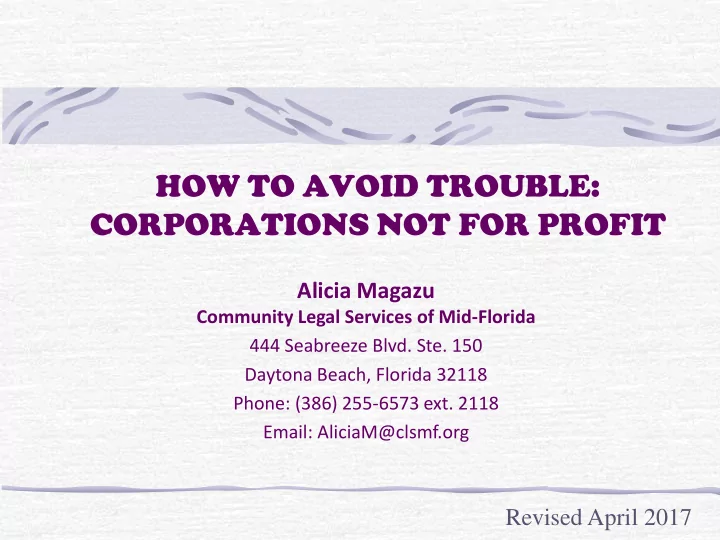

HOW TO AVOID TROUBLE: CORPORATIONS NOT FOR PROFIT Alicia Magazu Community Legal Services of Mid-Florida 444 Seabreeze Blvd. Ste. 150 Daytona Beach, Florida 32118 Phone: (386) 255-6573 ext. 2118 Email: AliciaM@clsmf.org Revised April 2017
KNOW THE NON- PROFIT RULES 26 U.S. Code § 501 - Exemption from tax on corporations, See www.irs.gov or call (877) 829-5500
KNOW THE NON- PROFIT RULES • Ch 617, Florida Statutes • FL Dept. of Agriculture and Consumer Services register to solicit charitable funds and renew annually • Florida Dept. of Revenue tax exemptions • Florida Dept. of State annual reports due by May 1
Basics of Corporate Liability BUSINESS JUDGMENT RULE • Boards are not liable if they act in GOOD FAITH for what they believe to be the BEST INTERESTS of the Corporation • Boards are not liable for honest mistakes or errors of judgment
ADDED ED PROTE OTECTIO CTION N for r NO NON-PROFITS PROFITS For-profit board members are personally liable if they act negligently Non-profit board members must be MORE THAN negligent to be personally liable
Follow the CORPORATE FORMALITIES to protect yourself from personal liability
What are the CORPORATE FORMALITIES? • Steps and precautions to make sure corporation stays separate from its owners • Make group decisions and take action properly (by resolution) • Keep a record of all meetings and actions taken by the board (minutes) • Exercise fiduciary duties • Keep a copy of your bylaws (with date of last revision)
Basic Duties of Board Members • Attend meetings • Pass resolutions • Develop budgets • Demand a reasonable standard of reporting and control • Read staff reports and take notice of problems raised • Respond to repeated warnings from staff, volunteers, or outside experts
The Role of Officers Unless a resolution is passed giving an officer permission to take action, he or she CANNOT act on behalf of the board! Extra duties, not extra power
The Role of Officers – Agency Law An agency relationship is formed when two people agree that one person (the Agent) is to act for the benefit of the other (the Principal).
The Role of Officers – Agency Law When a resolution gives an officer the power to take action on behalf of the corporation, the officer becomes an AGENT of the corporation. • For example, the board can pass a resolution to purchase property and allow the president to sign the deed.
DUTIES OF SECRETARIES It is vital for the Secretary to record the minutes, all actions and votes at the meetings. If the corporation has members, the Secretary should also create a membership book , recording member attendance and contact information at gatherings.
Keeping Minutes The minutes should include: • Time, date and place of meeting • Names of those present • Resolution adopting previous meeting’s minutes • Record of resolutions passed • Sign-in sheet
Taking Action: Resolutions How a corporation takes action • Board meeting with a quorum ( half +1 or defined in bylaws) • Board votes on motion and secretary records action in the minutes
How to Pass a Resolution • A board member gives a short description of the proposed action (a “motion” to adopt the resolution) • Another board member must “second” the motion • The chair repeats the motion and calls for discussion • The board votes on the resolution
What is a FIDUCIARY DUTY? Board members must act in good faith with fair dealing, full disclosure, and undivided loyalty to the corporation
COMMON VIOLATIONS OF FIDUCIARY DUTIES • Competing with the corporation • Personally taking corporate opportunities • Disclosing confidential information • Actively working to destroy or harm the organization • Not disclosing a conflict of interest
What is a CONFLICT OF INTEREST? Occurs when your personal or professional interests overlap the organization’s interests or business
How to Handle Conflicts of Interests • Disclose the potential conflict and step out of the meeting • Remaining members discuss whether the proposed deal is in the bests interests of the corporation (and document why) • Record the process in the minutes • Include a policy in bylaws
Questions will be answered at the end of the presentation Alicia Magazu, Esq. AliciaM@clsmf.org
Recommend
More recommend